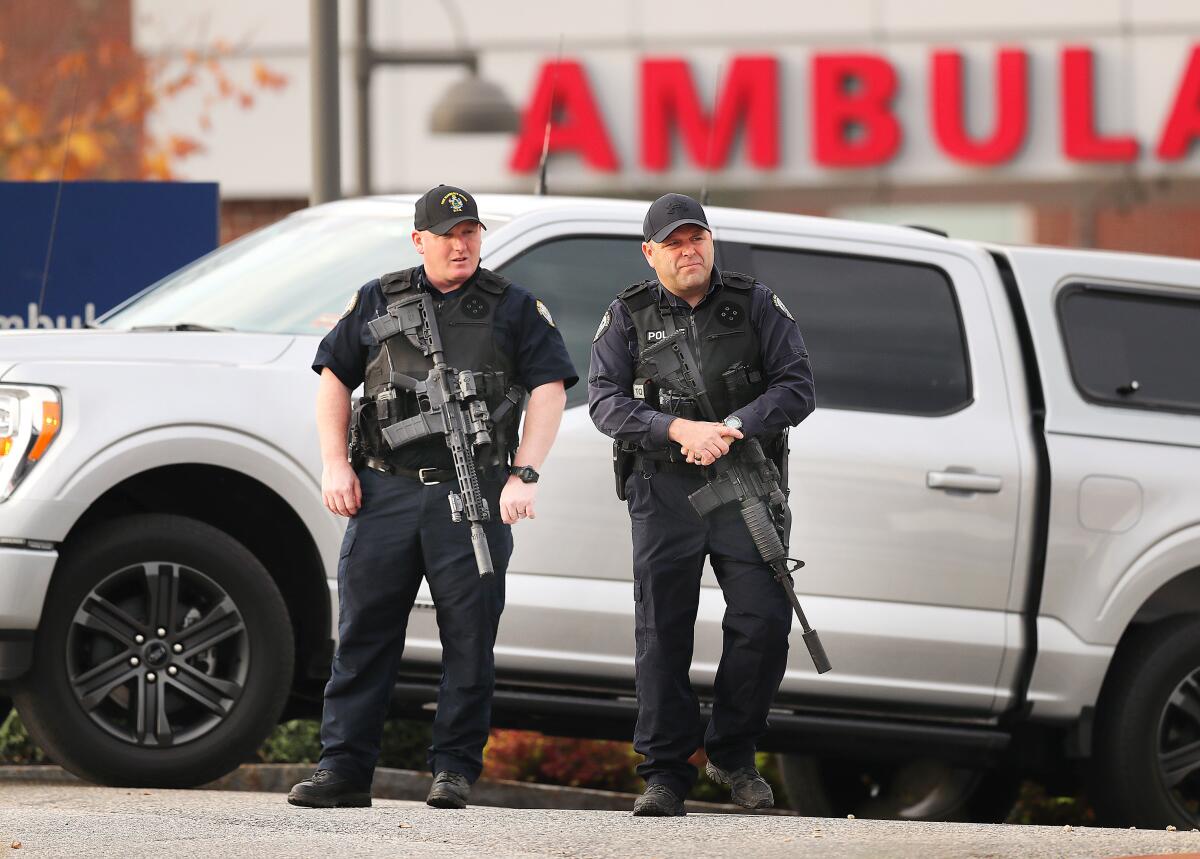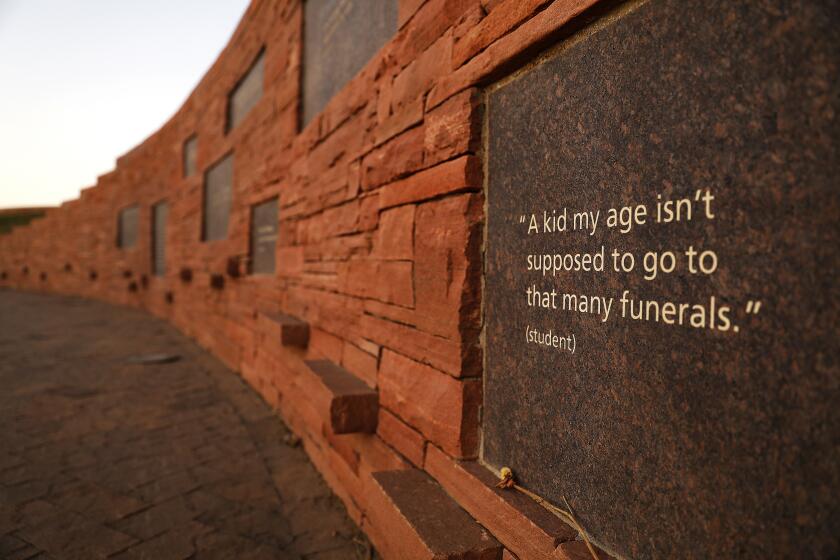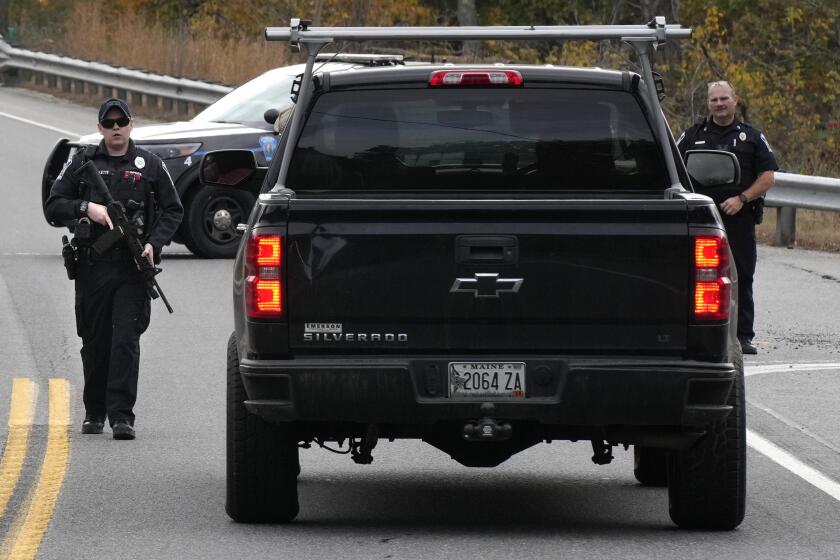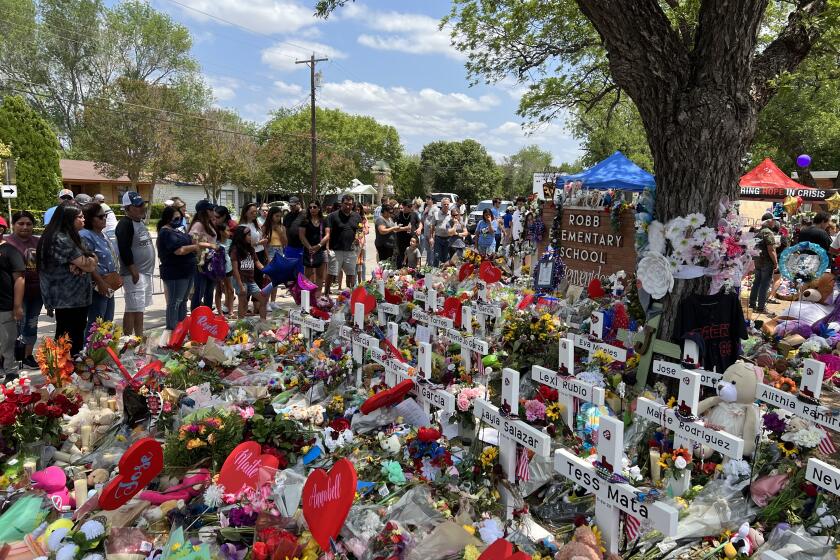Americans treat mass shootings like natural disasters. As if we can do nothing to prevent them

- Share via
America witnessed yet another mass shooting on Wednesday, this time in the small city of Lewiston, Maine. While people were shocked by the scale and location of the shooting — with 18 people slain in a state with one the country’s lowest homicide rates — no one was shocked that it occurred. Hearing how resigned commentators and politicians have become about yet another mass shooting emphasized something I’ve been thinking for a while: We’ve started treating mass shootings like natural disasters.
As a native Californian, I’m familiar with this approach. We grow up thinking of earthquakes as just a fact of life, destructive but unavoidable. Don’t get me wrong, we take earthquakes seriously, but since there’s nothing we can do to prevent them, we focus on preparing for them. We strengthen our homes, stock supplies in our earthquake kits and teach our kids to “duck and cover.”
Contributor: I lived through Columbine. Here’s what I have to say to survivors of mass shootings
Our country has mass shootings almost daily. I wish I could tell you after your incident that it will all be OK soon. But that would be a lie.
As mass shootings have increased in frequency and severity, we seem to have adopted a similar mindset. We can’t prevent them; we can only prepare for them. After the 1999 shooting at Columbine High School — the event that ushered in the modern era of mass shootings — we have mostly responded by treating mass shootings like earthquakes.
We strengthened our schools by stationing resource officers on campus and installing better locks and stronger doors. Inspired by the refrain that “the only thing that stops a bad guy with a gun is a good guy with a gun,” politicians and pundits concluded that we should expand concealed-carry licenses and arm teachers. We installed more cameras and metal detectors. We required students to bring clear plastic backpacks. We started conducting active shooter drills at our elementary schools, which replaced “duck and cover” with “run, hide, fight.” We turned our schools into fortresses and our children into watchers on the wall.
Authorities say 18 people were killed and 13 injured at two locations Wednesday night in Lewiston, the second-largest city in Maine.
And still mass shootings keep happening and we resign ourselves to the conclusion that we can only prepare for them. It makes sense. At some point, the earth is going to quake, the tornado is going to touch down, the hurricane is going to make landfall, so it’s foolish to pretend it’s not going to happen and it’s smart to prepare for the worst.
But are mass shootings really like natural disasters?
A better way to think about them, really, is like fires. Of course, we take fires seriously and do a lot to prepare for them to reduce the damage they cause. We install smoke detectors and fire extinguishers, we hire firefighters and pay them to be on call, round the clock. We install fire doors, conduct fire drills and label evacuation routes. We require space between single family homes to limit the chance that fire could spread from one building to the next. We require folks in fire-prone areas to “harden their homes” by creating “defensible space” and clearing out dead brush.
I am mourning 19 children I never knew.
But we don’t stop there. We focus as well on fire prevention. Local governments establish building codes regulating everything from construction materials and building techniques to wiring standards. Even consumer goods from refrigerators to robot vacuums are inspected to make sure that they don’t pose fire hazards.
Focusing on prevention doesn’t stop us from preparing for disasters, it just makes them less likely. We can and should do the same for mass shootings. Common sense and widely supported reforms such as instituting background checks and red flag lists for people with histories of violence; eliminating loopholes that allow for unregulated firearms sales at gun shows; reducing magazine capacity; restricting “ghost guns”; and banning the general sale of military-style rifles, such as the AR-15, will make it harder for “bad guys” to get guns and will prevent hundreds, if not thousands, of deaths every year.
If it were enough to simply have more good guys with guns, the fact that there are more guns than people in the U.S. should have reduced the number of mass shootings. Instead, we have more than ever. We must do better.
Peter Hanink is a criminology professor at Cal Poly Pomona.
More to Read
A cure for the common opinion
Get thought-provoking perspectives with our weekly newsletter.
You may occasionally receive promotional content from the Los Angeles Times.












